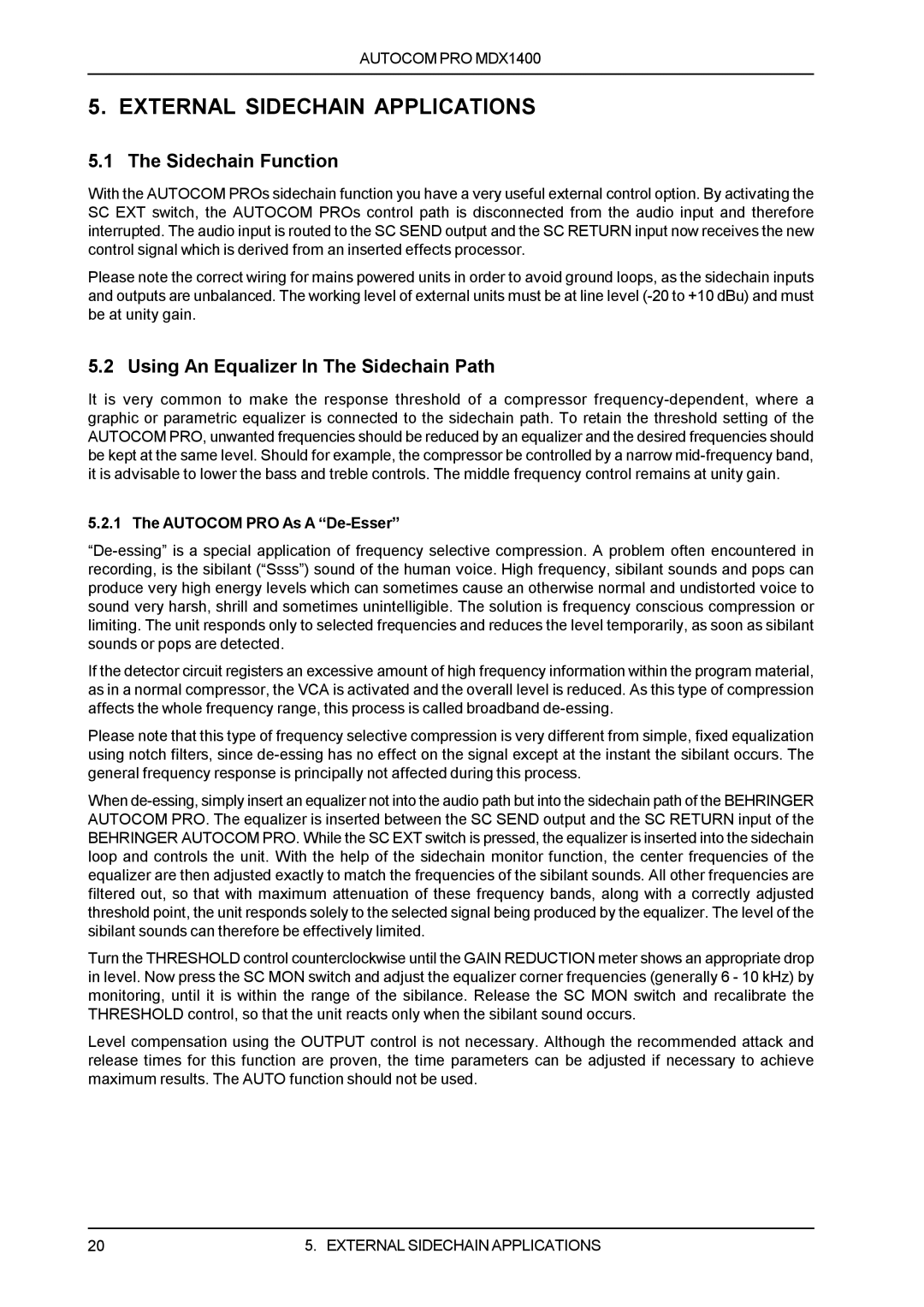AUTOCOM PRO MDX1400
5. EXTERNAL SIDECHAIN APPLICATIONS
5.1 The Sidechain Function
With the AUTOCOM PROs sidechain function you have a very useful external control option. By activating the SC EXT switch, the AUTOCOM PROs control path is disconnected from the audio input and therefore interrupted. The audio input is routed to the SC SEND output and the SC RETURN input now receives the new control signal which is derived from an inserted effects processor.
Please note the correct wiring for mains powered units in order to avoid ground loops, as the sidechain inputs and outputs are unbalanced. The working level of external units must be at line level (-20 to +10 dBu) and must be at unity gain.
5.2 Using An Equalizer In The Sidechain Path
It is very common to make the response threshold of a compressor frequency-dependent, where a graphic or parametric equalizer is connected to the sidechain path. To retain the threshold setting of the AUTOCOM PRO, unwanted frequencies should be reduced by an equalizer and the desired frequencies should be kept at the same level. Should for example, the compressor be controlled by a narrow mid-frequency band, it is advisable to lower the bass and treble controls. The middle frequency control remains at unity gain.
5.2.1 The AUTOCOM PRO As A “De-Esser”
“De-essing” is a special application of frequency selective compression. A problem often encountered in recording, is the sibilant (“Ssss”) sound of the human voice. High frequency, sibilant sounds and pops can produce very high energy levels which can sometimes cause an otherwise normal and undistorted voice to sound very harsh, shrill and sometimes unintelligible. The solution is frequency conscious compression or limiting. The unit responds only to selected frequencies and reduces the level temporarily, as soon as sibilant sounds or pops are detected.
If the detector circuit registers an excessive amount of high frequency information within the program material, as in a normal compressor, the VCA is activated and the overall level is reduced. As this type of compression affects the whole frequency range, this process is called broadband de-essing.
Please note that this type of frequency selective compression is very different from simple, fixed equalization using notch filters, since de-essing has no effect on the signal except at the instant the sibilant occurs. The general frequency response is principally not affected during this process.
When de-essing, simply insert an equalizer not into the audio path but into the sidechain path of the BEHRINGER AUTOCOM PRO. The equalizer is inserted between the SC SEND output and the SC RETURN input of the BEHRINGER AUTOCOM PRO. While the SC EXT switch is pressed, the equalizer is inserted into the sidechain loop and controls the unit. With the help of the sidechain monitor function, the center frequencies of the equalizer are then adjusted exactly to match the frequencies of the sibilant sounds. All other frequencies are filtered out, so that with maximum attenuation of these frequency bands, along with a correctly adjusted threshold point, the unit responds solely to the selected signal being produced by the equalizer. The level of the sibilant sounds can therefore be effectively limited.
Turn the THRESHOLD control counterclockwise until the GAIN REDUCTION meter shows an appropriate drop in level. Now press the SC MON switch and adjust the equalizer corner frequencies (generally 6 - 10 kHz) by monitoring, until it is within the range of the sibilance. Release the SC MON switch and recalibrate the THRESHOLD control, so that the unit reacts only when the sibilant sound occurs.
Level compensation using the OUTPUT control is not necessary. Although the recommended attack and release times for this function are proven, the time parameters can be adjusted if necessary to achieve maximum results. The AUTO function should not be used.

